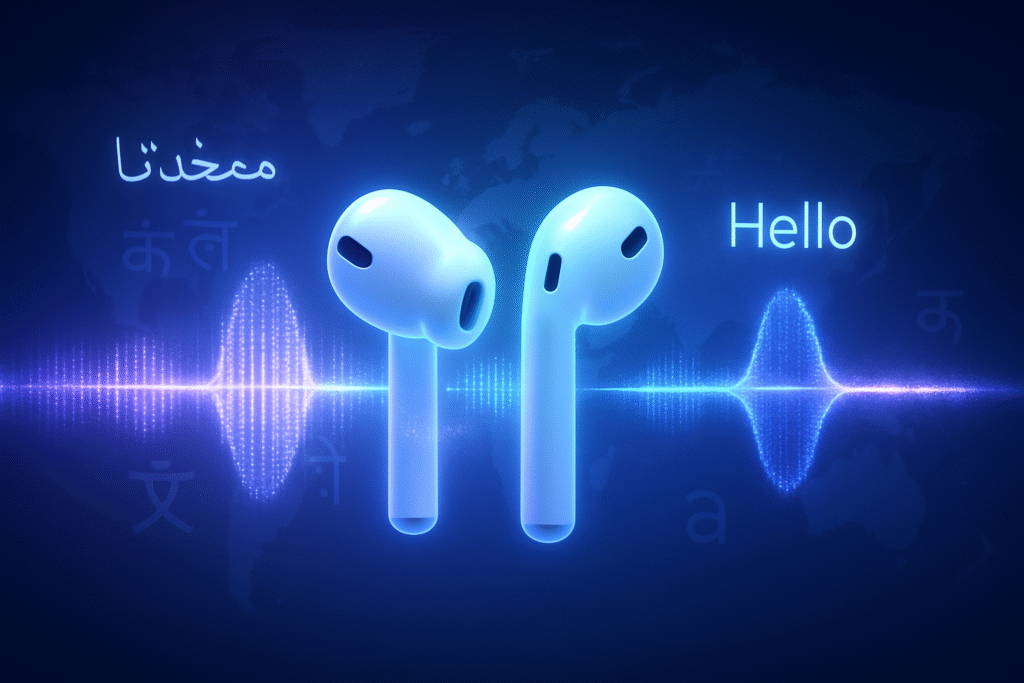
Apple (NASDAQ: AAPL) has officially ushered in a new era of global communication with the rollout of real-time AI translation capabilities for its AirPods, dubbed "Live Translation." Launched on September 15, 2025, as a cornerstone of the new Apple Intelligence features and the release of iOS 26, this groundbreaking functionality promises to dissolve linguistic divides, making seamless cross-cultural interactions a daily reality. Unveiled alongside the AirPods Pro 3, Live Translation integrates directly into the Apple ecosystem, offering an unprecedented level of convenience and privacy for users worldwide.
The immediate significance of this innovation cannot be overstated. From spontaneous conversations with strangers in a foreign country to crucial business discussions across continents, AirPods' Live Translation aims to eliminate the friction traditionally associated with language differences. By delivering instantaneous, on-device translations directly into a user's ear, Apple is not just enhancing a product; it's redefining the very fabric of personal and professional communication, making the world feel a little smaller and more connected.
The Mechanics of Multilingual Mastery: Apple's Live Translation Deep Dive
The "Live Translation" feature in Apple's AirPods represents a significant leap in wearable AI, moving beyond simple phrase translation to facilitate genuine two-way conversational fluency. At its core, the system leverages advanced on-device machine learning models, part of the broader Apple Intelligence suite, to process spoken language in real-time. When activated—either by simultaneously pressing both AirPod stems, a Siri command, or a configured iPhone Action button—the AirPods intelligently capture the incoming speech, transmit it to the iPhone for processing, and then deliver the translated audio back to the user's ear with minimal latency.
This approach differs markedly from previous translation apps or devices, which often required handing over a phone, relying on a speaker for output, or enduring noticeable delays. Apple's integration into the AirPods allows for a far more natural and discreet interaction, akin to having a personal, invisible interpreter. Furthermore, the system intelligently integrates with Active Noise Cancellation (ANC), dynamically lowering the volume of the original spoken language to help the user focus on the translated audio. Crucially, Apple emphasizes that the translation process occurs directly on the device, enhancing privacy by keeping conversations local and enabling functionality even without a constant internet connection. Initial language support includes English (UK and US), French, German, Portuguese (Brazil), and Spanish, with plans to expand to Italian, Japanese, Korean, and Chinese by the end of 2025. While revolutionary for casual use, initial reactions from the AI research community acknowledge its impressive capabilities but also temper expectations, noting that while highly effective for everyday interactions, the technology is not yet a complete substitute for professional human interpreters in nuanced, high-stakes, or culturally sensitive scenarios.
Reshaping the AI and Tech Landscape: A Competitive Edge
Apple's foray into real-time, on-device AI translation via AirPods is set to send ripples across the entire tech industry, particularly among AI companies and tech giants. Apple (NASDAQ: AAPL) itself stands to benefit immensely, solidifying its ecosystem's stickiness and providing a compelling new reason for users to invest further in its hardware. This development positions Apple as a frontrunner in practical, user-facing AI applications, directly challenging competitors in the smart accessory and personal AI assistant markets.
The competitive implications for major AI labs and tech companies are significant. Companies like Google (NASDAQ: GOOGL), with its Pixel Buds and Google Translate, and Microsoft (NASDAQ: MSFT), with its Translator services, have long been players in this space. Apple's seamless integration and on-device processing for privacy could force these rivals to accelerate their own efforts in real-time, discreet, and privacy-centric translation hardware and software. Startups focusing on niche translation devices or language learning apps might face disruption, as a core feature of their offerings is now integrated into one of the world's most popular audio accessories. This move underscores a broader trend: the battle for AI dominance is increasingly being fought at the edge, with companies striving to deliver intelligent capabilities directly on user devices rather than solely relying on cloud processing. Market positioning will now heavily favor those who can combine sophisticated AI with elegant hardware design and a commitment to user privacy.
The Broader Canvas: AI's Impact on Global Connectivity
The introduction of real-time AI translation in AirPods transcends a mere product upgrade; it signifies a profound shift in the broader AI landscape and its societal implications. This development aligns perfectly with the growing trend of ubiquitous, embedded AI, where intelligent systems become invisible enablers of daily life. It marks a significant step towards a truly interconnected world, where language is less of a barrier and more of a permeable membrane. The impacts are far-reaching: it will undoubtedly boost international tourism, facilitate global business interactions, and foster greater cultural understanding by enabling direct, unmediated conversations.
However, such powerful technology also brings potential concerns. While Apple emphasizes on-device processing for privacy, questions about data handling, potential biases in translation algorithms, and the ethical implications of AI-mediated communication will inevitably arise. There's also the risk of over-reliance, potentially diminishing the incentive to learn new languages. Comparing this to previous AI milestones, the AirPods' Live Translation can be seen as a practical realization of the long-held dream of a universal translator, a concept once confined to science fiction. It stands alongside breakthroughs in natural language processing (NLP) and speech recognition, moving these complex AI capabilities from academic labs into the pockets and ears of everyday users, making it one of the most impactful consumer-facing AI advancements of the decade.
The Horizon of Hyper-Connected Communication: What Comes Next?
Looking ahead, the real-time AI translation capabilities in AirPods are merely the first chapter in an evolving narrative of hyper-connected communication. In the near term, we can expect Apple (NASDAQ: AAPL) to rapidly expand the number of supported languages, aiming for comprehensive global coverage. Further refinements in accuracy, particularly in noisy environments or during multi-speaker conversations, will also be a priority. We might see deeper integration with augmented reality (AR) platforms, where translated text could appear visually alongside the audio, offering a richer, multi-modal translation experience.
Potential applications and use cases on the horizon are vast. Imagine real-time translation for educational purposes, enabling students to access lectures and materials in any language, or for humanitarian efforts, facilitating communication in disaster zones. The technology could evolve to understand and translate nuances like tone, emotion, and even cultural context, moving beyond literal translation to truly empathetic communication. Challenges that need to be addressed include perfecting accuracy in complex linguistic situations, ensuring robust privacy safeguards across all potential future integrations, and navigating regulatory landscapes that vary widely across different regions, particularly concerning data and AI ethics. Experts predict that this technology will drive further innovation in personalized AI, leading to more adaptive and context-aware translation systems that learn from individual user interactions. The next phase could involve proactive translation, where the AI anticipates communication needs and offers translations even before a direct request.
A New Dawn for Global Interaction: Wrapping Up Apple's Translation Breakthrough
Apple's introduction of real-time AI translation in AirPods marks a pivotal moment in the history of artificial intelligence and human communication. The key takeaway is the successful deployment of sophisticated, on-device AI that directly addresses a fundamental human challenge: language barriers. By integrating "Live Translation" seamlessly into its widely adopted AirPods, Apple has transformed a futuristic concept into a practical, everyday tool, enabling more natural and private cross-cultural interactions than ever before.
This development's significance in AI history lies in its practical application of advanced natural language processing and machine learning, making AI not just powerful but profoundly accessible and useful to the average consumer. It underscores the ongoing trend of AI moving from theoretical research into tangible products that enhance daily life. The long-term impact will likely include a more globally connected society, with reduced friction in international travel, business, and personal relationships. What to watch for in the coming weeks and months includes the expansion of language support, further refinements in translation accuracy, and how competitors respond to Apple's bold move. This is not just about translating words; it's about translating worlds, bringing people closer together in an increasingly interconnected age.
This content is intended for informational purposes only and represents analysis of current AI developments.
TokenRing AI delivers enterprise-grade solutions for multi-agent AI workflow orchestration, AI-powered development tools, and seamless remote collaboration platforms.
For more information, visit https://www.tokenring.ai/.





